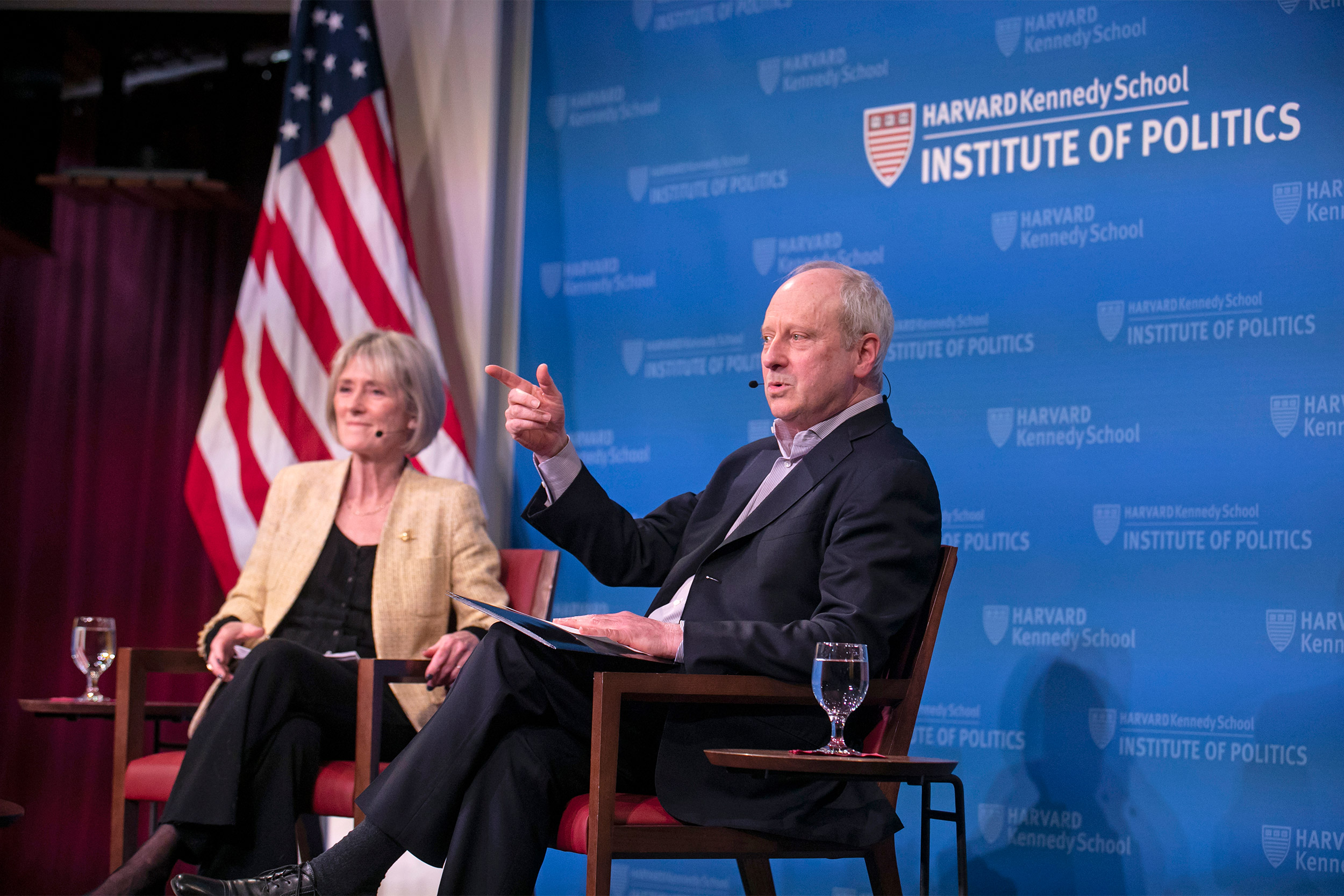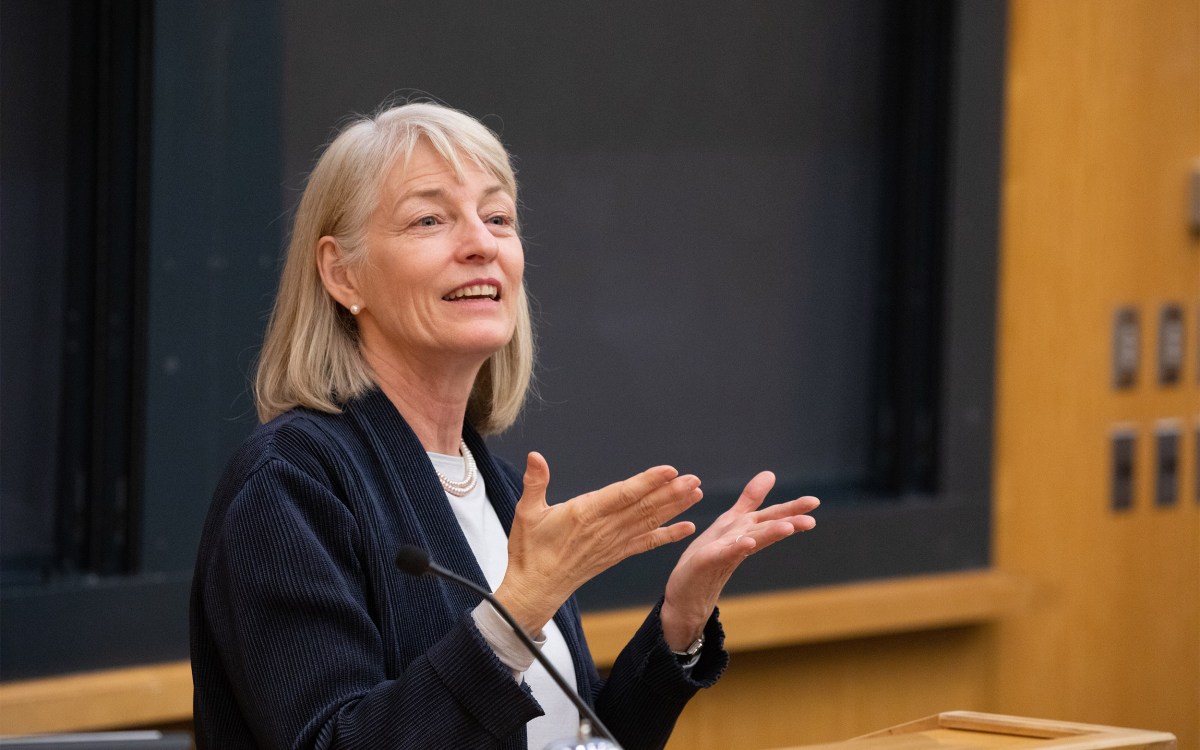
Gwyneth Williams and Michael Sandel discuss covering the competition of ideas in today’s polarized environment.
Jon Chase/Harvard Staff Photographer
Why ‘truth’ beats facts
Discussion takes a look at why arguments fail and why the sides cannot agree
Gwyneth Williams got vital lessons in the importance of truth while she was growing up in apartheid South Africa. The former editorial leader of the BBC’s World Service and its Radio 4 and spring 2020 Shorenstein Center Fellow said she often returned home from school to find her father, an “admittedly eccentric” professor, on the roof fiddling with the radio antenna. He wanted to ensure his family would be able to hear BBC news, “a lifeline in a society where there was propaganda everywhere.”
That trust in facts seems almost quaint these days, agreed Williams and Michael Sandel, Bass Professor of Government Theory at Harvard Law School, at a Harvard Kennedy School discussion on Thursday. “Does Truth Have a Future?” explored how the boundaries of fact and propaganda are blurring in a deeply riven, post-truth world.
Sandel noted that Williams may be particularly qualified to examine the possibilities of seeing truth more broadly owing to her experience at Radio 4, which he described as “PBS, NPR, and The Atlantic all in one.” Williams produced Sandel’s Radio 4 series, “The Public Philosopher,” which featured debates with audience members, and Sandel noted Williams’ innovative approach to news programming, which adds related art and cultural context to straight reporting.
Williams said these additions reach for a deeper truth than the practice of “rolling news” — the reiteration and hyping up of lead stories on many cable channels. “A pattern has developed with the repetition of these stories, and the heightened emotion. Together with digital media, this can have a brutalizing effect,” she said. Thus when Radio 4 covered the Arab Spring uprising nine years ago, it also covered related music and literature, in particular “The Cairo Trilogy” by Egyptian novelist Naguib Mahfouz, which chronicles the lives of a family across three generations.
“I am not saying we should move away from hard news, but I believe very strongly that it needs to be deepened,” Williams said.
“Nobody actually believed that Mexico was going to write a check and pay for the wall, but they knew what [Trump] meant.”
Michael Sandel
To consider truth’s role in current U.S. politics, Sandel noted that facts alone are not enough to heal political divides. He cited the widespread belief that people might find agreement on such key issues as immigration and climate change if all were better educated about underlying facts. “But I think this is a misreading of what ails democracy. There is a difference between factual truth, and what we might call moral or spiritual truth. The reason we disagree about facts is because we disagree about the underlying moral and political questions — not the other way around.”
As an example Sandel cited President Trump’s well-known, untrue pronouncement that “We’re going to build a wall, and Mexico will pay for it.” This was one of the 16,241 false or inaccurate statements by Trump that The Washington Post tallied during his first three years in office. Yet Sandel suggested that fact-checking and analysis are beside the point, since they haven’t changed many peoples’ minds about the president or his administration. The real truth, he said, stretches into something deeper — namely the beliefs of the people who embrace the statement.
“Nobody actually believed that Mexico was going to write a check and pay for the wall,” he said. “But they knew what [Trump] meant. He was making an argument that touched on their experiences, convictions, hopes, and fears. Fact-checkers will point out it is not true, and it isn’t as a matter of fact. But it has a claim that is rooted in a certain kind of political argument. And that is the level we have to take it on.”
Similarly, he said the disagreement over climate change increases, surprisingly, with the level of education of those involved. As Williams noted, the BBC includes these disagreements in its reporting: “The rule is to say that the preponderance of evidence may support viewpoint X, but we will also discuss viewpoint Y.”
In the talk’s final segment, Sandel and Williams emulated Radio 4’s eclectic style by bringing music and poetry into the mix. They played a video of Whitney Houston’s 1991 performance of “Battle Hymn of the Republic” (with the famous chorus “His truth is marching on”) to mark the return of troops after the first Gulf War. They also read an Emily Dickinson poem, “Tell all the truth but tell it slant.” Sandel invited the audience to consider how both these works register on the “truth meter,” and try to understand how they may evoke powerful feelings of truth that extends beyond factual accuracy.
Sandel gave his most direct answer when a student asked how to promote the cause of truth through these gray areas. “By taking on and engaging with the deep convictions of those with whom we disagree,” he answered. “We shouldn’t do this out of the conviction that maybe we will change their minds, but that maybe we will see them more clearly, more sympathetically, as a result of this engagement and dialogue.”







